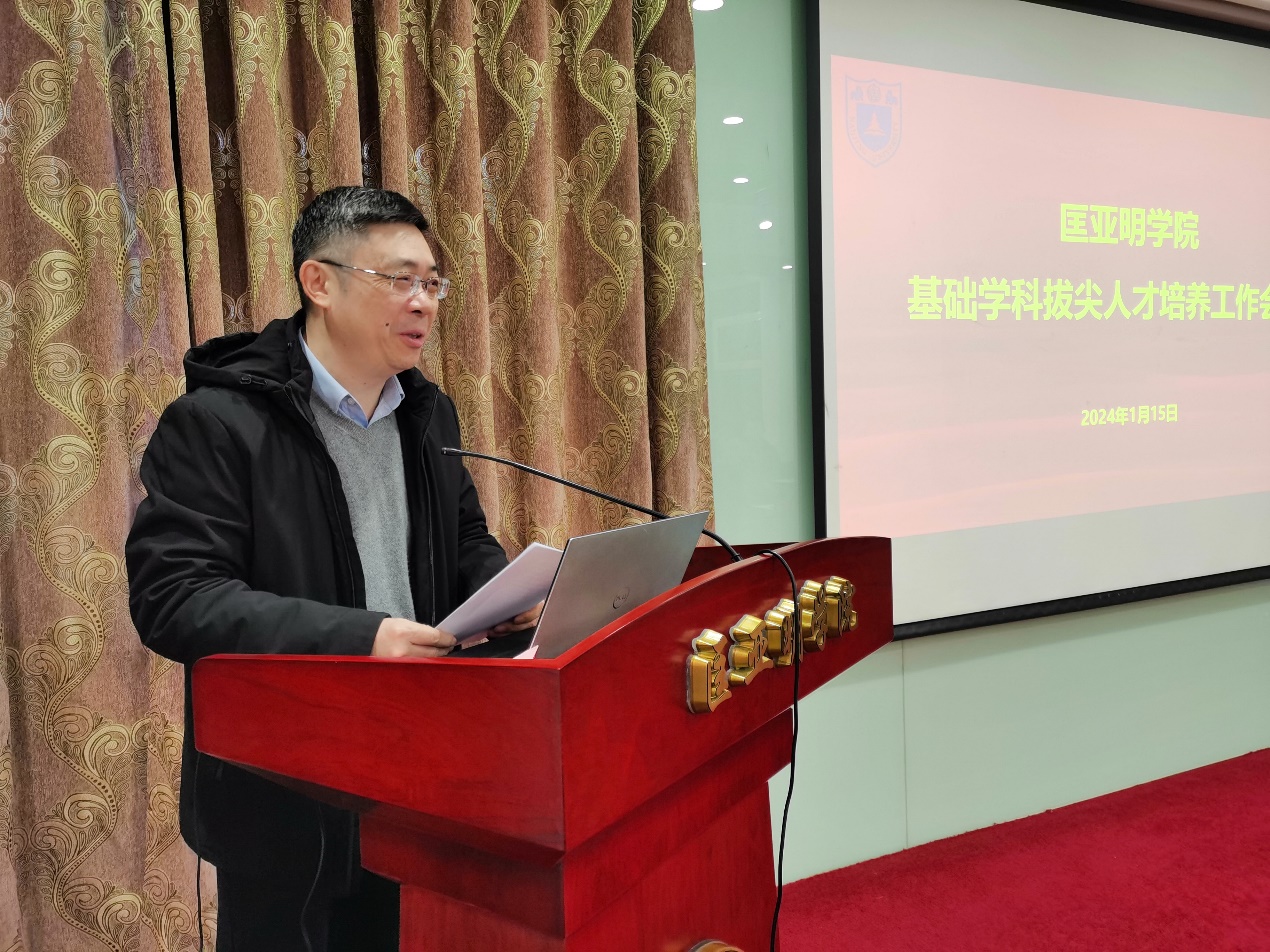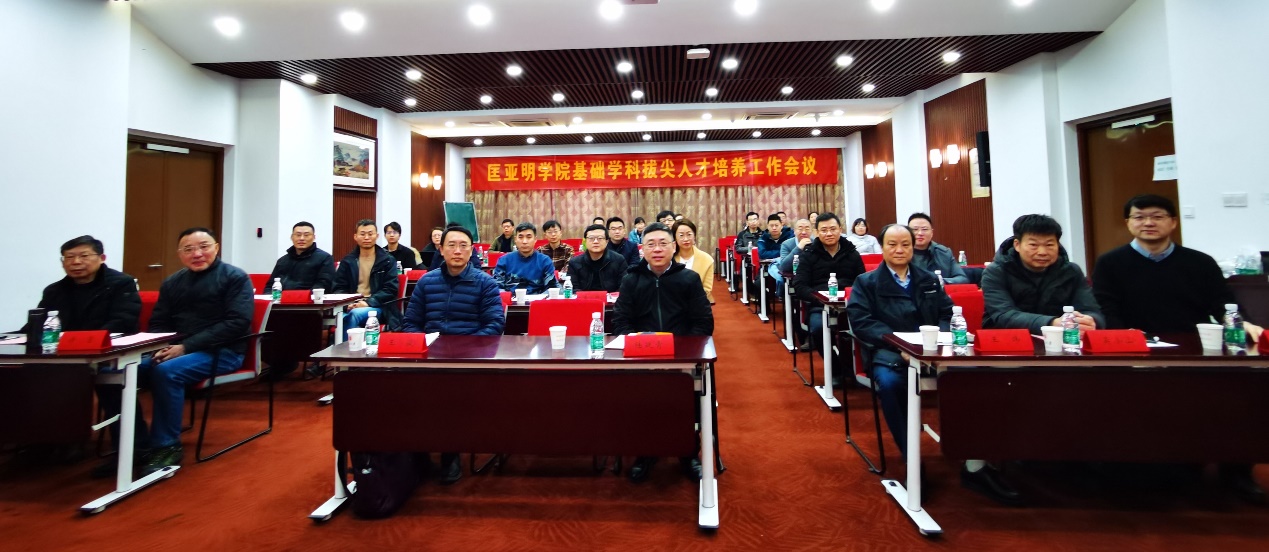On January 15, 2024, the Conference on Cultivating Top-Notch Talents of Basic Disciplines of Kuang Yaming Honors School was successfully held in the Zheng Gang Lecture Hall. The event was attended by Lu Yanqing, Vice President of Nanjing University; Wang Jun, Executive Dean of the Undergraduate School, and Party Secretary and Dean of Kuang Yaming Honors School; Pan Bai, Director of the Undergraduate School’s Teaching Operations and Services Center; Zhu Jingning, Vice Dean of the School of Life Sciences; Shen Furao, Vice Dean of the School of Artificial Intelligence; Cheng Xin, Vice Dean of the School of Astronomy and Space Sciences; Tang Yang, Vice Dean of the Global Institute for Innovation and Entrepreneurship; faculty representatives from various departments, all faculty of Kuang Yaming Honors School, and alumni representatives. The meeting was chaired by Dong Hao, Vice Dean of Kuang Yaming Honors School.

Vice President Lu Yanqing first extended heartfelt gratitude on behalf of the university for the school’s exploration and contributions in cultivating top innovative talents. He pointed out that Kuang Yaming Honors School has consistently focused on the cultivation of top-notch talents in basic disciplines, acting as a pioneer in the university’s talent development endeavors. The school’s teaching reforms have also provided valuable experience for Nanjing University’s “Three-Three System.” Under the new circumstances, how to improve the talent cultivation of Kuang Yamin Honors School and how to sharpen the sword of NJU is a topic we should think together. He believed that it is important to highlight both “change” and “not change”: what does not change is NJU’s unwavering pursuit of high-quality talent cultivation; what should change is our talent cultivation methods and initiatives. Nanjing University is centering its efforts around the “Forging Ahead Initiative” by formulating a special action plan for cultivating top-notch innovative talents. Through systematic reforms, the university hopes to further enhance its talent cultivation capabilities, focus on identifying the unique qualities of talents in the new era, and nurture individuals who can meet the needs of both the nation and the times. The development of Nanjing University’s student training model, faculty team building, and the improvement of its teaching and research system requires the collective efforts of everyone. He encouraged the attending teachers to contribute actively to advancing the “Forging Ahead Initiative” and building the “First Nanjing University.”
Vice Dean Dong Hao then announced the members of the newly appointed Teaching Committee. Vice President Lu Yanqing, along with distinguished professors Lu Dexin, Xu Wang, Wang Wei, Wu Xiaoshan, and Ge Xin, were invited to serve as advisors to the committee. Wang Jun was appointed as the chair of the committee, and Dong Hao as the deputy chair. Vice deans in charge of teaching from relevant schools and core course teachers were appointed as committee members. Dean Wang Jun and Deputy Secretary Zhou An presented appointment certificates to the advisors and members of the new Teaching Committee.
In recent years, the Kuang Yaming Honors School has achieved a series of remarkable results in teaching reforms and talent cultivation. Students from the school have won prestigious accolades, including the Gold Award in the Final of the 8th China International College Students’ “Internet+” Innovation and Entrepreneurship Competition, the Special Award for Nanjing University Undergraduate Thesis, and the Special Award for the Nanjing University Dongliang Scholarship. Two students were selected for the National Natural Science Foundation’s Outstanding Undergraduate Student Funding Program, and the school was recognized as an Excellent Grassroots Teaching Organization in Jiangsu Province. The talent cultivation at Kuang Yaming Honors School owes much to the strong support of various departments and schools. During the conference, the school honored and presented certificates to faculty representatives and teaching teams who have made significant contributions to the school’s talent cultivation. Vice Dean Tang Yang from the the Global Institute for Innovation and Entrepreneurship, Professor Li Wujun from the School of Computer Science and Technology, and Professors Yuan Hongtao and Kong Desheng from the School of Engineering and Applied Sciences shared their valuable experiences in mentoring students. Wang Xiao, a 2014 alumnus of the Kuang Yaming Honors School and Gold Award winner in the Final of the 8th China International College Students’ “Internet+” Innovation and Entrepreneurship Competition, also shared his learning and research experiences at the school. He expressed gratitude for the school’s free academic environment, which allowed him to independently design and plan his future, laying a solid foundation for his subsequent development.
Another important agenda item of the meeting was the discussion on the reform of the top-notch talent cultivation program at Kuang Yaming Honors School. Based on the guidance provided by the university’s “Forging Ahead Initiative,” Vice Dean Dong Hao presented a comprehensive talent cultivation reform plan after conducting in-depth research and listening to a wide range of views, taking the background of the current paradigm change in scientific research into account. The proposal covers multiple areas, including the curriculum structure, student evaluation system, and faculty development, with the goal of comprehensively enhancing the quality and effectiveness of the school’s talent cultivation.
Firstly, in terms of the curriculum system, the plan aims to further break down disciplinary barriers, optimize course settings, and introduce interdisciplinary and cross-major courses. It will also promote early-stage research training and international exchange, effectively implementing the school’s philosophy of talent cultivation: “broad scope, solid foundation, close to the cutting edge, and internationalization.” Secondly, in terms of the student evaluation system, the plan proposes gradually replacing the “percentage system” with a “grading system” to overcome the involution diemma of “focusing only on scores.” The emphasis will be on process evaluation, with the establishment of multidimensional evaluation criteria that take into account factors such as academic performance, practical skills, innovation awareness, and developmental potential. These will be applied across various aspects of student selection, training, and award assessments. Additionally, the establishment of a digital platform for student (and graduate) information will allow for intelligent monitoring of students’ growth progress and long-term tracking. In terms of faculty development, the plan proposes a comprehensive evaluation for current teaching and research faculty, considering multiple dimensions such as “teaching reform,” “talent cultivation,” “scientific research,” and “social service.” This will connect teaching reform with research performance and emphasize faculty contributions to teaching reform and the cultivation of top-notch talents. The plan also suggests setting up a database of research mentor from foreign departments, actively exploring the “dual appointment” model for outstanding faculty, and forming a new situation of integration and development with professional colleges. Additionally, the establishment of “Kuang Yaming Distinguished Teaching Positions” will allow for the recruitment of renowned educators and the creation of first-class courses. With reference to the quasi-permanent appointment system, the school will introduce high-quality teachers in teaching and research posts to improve the level of scientific research and talent cultivation. Professors Wang Wei, Wu Xiaoshan, Xu Wang, Ge Xin, Zhu Jingning, and others provided valuable feedback on the reform proposal, contributing their insights to the school’s talent cultivation reform.
Dean Wang Jun concluded the conference with a summary speech. He emphasized that this conference was a significant event for the cultivation of top-notch talents at Kuang Yaming Honors School, as it clarified the ideas and set the direction for the school’s talent cultivation reform. As an important part of Nanjing University, Kuang Yaming Honors School needs to gather the strength of the entire university and work together to polish its reputation for cultivating top-notch talents. He encouraged all faculty and students to unite and collectively advance the school’s efforts in cultivating top-notch talents. He believed that, with everyone’s joint efforts, Kuang Yaming Honors School would surely be able to cultivate more outstanding and top-notch innovative talents for the country, and make greater contributions to the development of Nanjing University.



